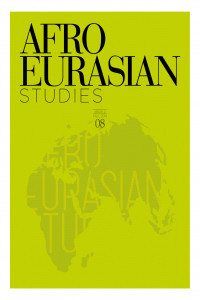The Nature of Lobbying and Regulation in Turkey
The Nature of Lobbying and Regulation in Turkey
Economic Policy, Growth, Development, Lobbying, Interest-group, Protectionism Government Regulation.,
___
- Amelung, Torsten. (1989). “The Determinants of Protection in Developing Countries: An Extended Interest-Group Approach”, Kyklos, Vol. 42 J, No: 4, , pp. 515-532.
- Anderson, Kym. (1995) “Lobbying Incentives and the Pattern of Protection in Rich and Poor Countries”, Economic Development and Cultural Change, Vol. 43, No. 2, Janu- ary, pp. 401- 423.
- Annual Reports: TUSIAD (2007 and 2011) and MUSIAD (2007 and 2011).
- Becker, Gary S., (1983). “A Theory of Competition Among Pressure Groups for Political Influence”, The Quarterly Journal of Economics, Vol. 98, No. 3, August, pp. 371- 400.
- Buchanan, James M., (1965). “An Economic Theory of Clubs”, Economica, New Series, Vol. 32, No. 125, pp. 1- 14.
- Coase, Ronald H., (1960). “The Problem of Social Cost”, Journal of Law and Economics, October, pp. 1-44.
- Bugra, Ayse, (1998). “Class, Culture and State: An Analysis of Interest Representation by Two Turkish Business Associations”. International Journal of Middle East Studies, Vol. 30 No. 4, , pp. 521-539.
- Bugra, Ayse, (2002). “Labour Capital and Religion: Harmony and Conflict among the Constituency of Political Islam in Turkey”, Middle Eastern Studies, Vol. 38 No. 2, April, p. 193.
- Doner, Richard F. and Schneider, Ben Ross, (2000). “Business Associations and Eco- nomic Development: Why Some Associations Contribute More Than Others”, Business and Politics, Vol. 2, No. 3, pp. 261- 288.
- Grossman, Gene M. and Helpman, Elhanan, (1994) “Protection for Sale”, American Eco- nomic Review, Vol. 84, No. 4, pp. 833- 850.
- Grossman, Gene M. and Helpman, Elhanan, (2002). Interest Groups and Trade Policy, Princeton University Press,
- Hardin, Garrett, (1968). “The Tragedy of the Commons”, Science. Vol. 162 No. 3859, pp. 1243-1248.
- Independent Industrialists’ and Businessmen’s Association, Economic Report on Turkish Economy 2007, June 2007.
- Kahn, Alfred, The Economics of Regulation Principles and Institutions, vol. I-II, The MIT Press, 1988.
- Maitland, Ian, (1985). “Interest Groups and Economic Growth Rates”, The Journal of Politics, Vol. 47, No. 1, 44-58.
- Mork, Knut Anton, (1993). “Living with Lobbying: A Growth Policy Co-Opted by Lob- byists Can Be Better than No Growth Policy at All”, The Scandinavian Journal of Economics, Vol. 95, No. 4 (Dec.), pp. 597- 605.
- Murphy, K. M., A. Shleifer and R. Vishny., (1991). “The Allocation of Talent: Implica- tions for Growth”, The Quarterly Journal of Economics, Vol. 106, pp. 503-530.
- North, Douglass C., (1983). “A Theory of Economic Change” (Review), Science, New Series, Vol. 219, No. 4581, 163- 164.
- Olson, Mancur, (1965). The Logic of Collective Action, Harvard University Press, Cam- bridge.
- Olson, Mancur, (1982). The Rise and Decline of Nations, Yale University Press,
- Öniş, Ziya and Türem, Umut, (2001). Entrepreneurs, Democracy and Citizenship in Turkey, July
- Öniş, Ziya and Webb, Steven B., (1992). Political Economy of Policy Reform in Turkey in the 1980s, World Bank Policy Research Working Papers WPS 1059.
- Özdemir, Şennur, (2005). Some Notes on the Possibility of an “Islamic Economy” A Case Study, The Turkish Yearbook, Vol. 36, pp. 201-216.
- Peltzman, Sam, (1976). “Toward a More General Theory of Regulation”, Journal of Law and Economics.
- Persson, Torsten, (1998). Economic Policy and Special Interest Politics, Economic Journal, Vol. 108, No. 447, pp. 310- 327.
- Posner, Richard A., (1974). “Theories of Economic Regulation”, Bell Journal of Economics and management Science, Vol. 5 pp. 335- 358.
- Shambayati, Hootan, The Rentier State, (1994). “Interest Groups, and the Paradox of Autonomy”, Comparative Politics, Vol. 26, No. 3, April, pp. 307- 331.
- Stigler, George J., (1971). “The Theory of Economic Regulation”, The Bell Journal of Eco- nomics and Management Science.
- Tullock, Gordon. (1983). “The Rise and Decline of Nations by Mancur Olson” (Review), Public Choice, Vol. 40, No. 1 pp. 111- 116.
- Turkish Industrialists’ and Businessmen’s Association (TUSIAD) and Organization for Economic Co-Operation and Development (OECD), Understanding Economic Growth, April 2005(a).
- Turkish Industrialists’ and Businessmen’s Association (TUSIAD) Report, Turkish Econ- omy Towards 2006: From Stability to Sustainable Growth, December 2005(b).
- Williamson, O. E., (1979). “Transaction-Cost Economis: The Governance of Contrac- tual Relations”, Journal of Law and Economics, Vol. 22 No. 2, pp. 233-261.
- Williamson, O. E., (1985). The Economic Institutions of Capitalism, , New York, NY: Free Press.
- Yankaya, Dilek, (2009). “The Europeanization of MUSIAD: Political opportunism, Economic Europeanization, Islamic Euroscepticism”, European Journal of Turkish Studies (Online), Vol. 9.
- ISSN: 2147-110X
- Yayın Aralığı: Yıllık
- Başlangıç: 2012
- Yayıncı: Musiad (Independent Industrialists and Businessmen's Association)
Income Distribution in Europe and its Effect on Investment Priorities
Understanding the ‘Arab Spring’: Justice, Dignity, Religion and International Politics
The Nature of Lobbying and Regulation in Turkey
Turkey in the World Trading System and the WTO: Activism under Global Challenges and the EU Process
The Concept of “Middle Power” and the Recent Turkish Foreign Policy Activism
Are Sukuk Securities the Same as Conventional Bonds?
Generalized Formulae for Islamic Home Financing through the Musharakah Mutanaqisah Contracts
